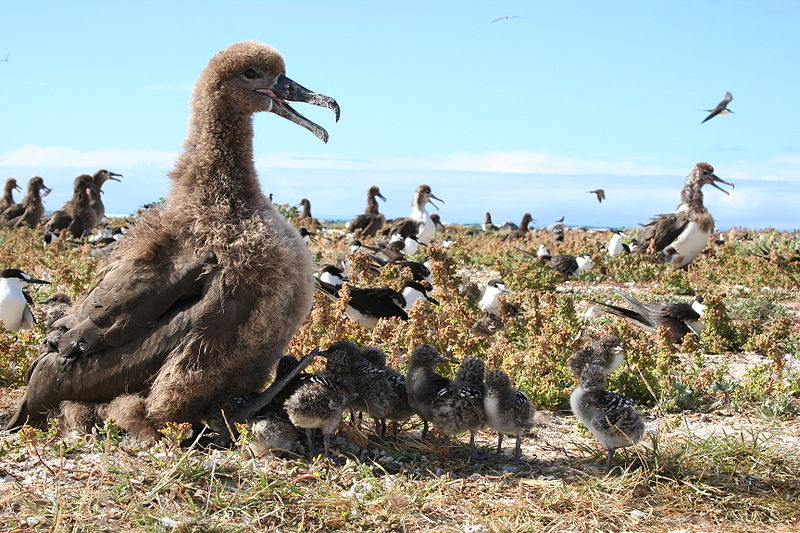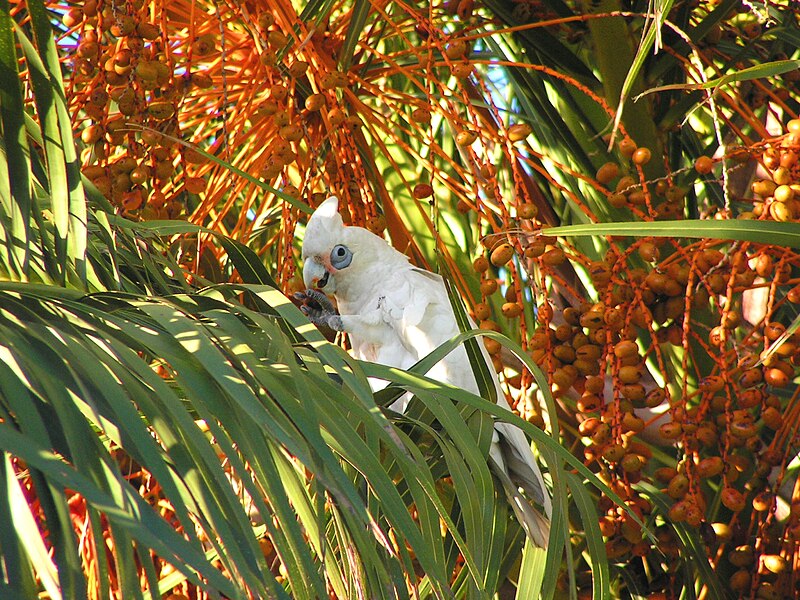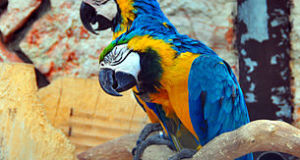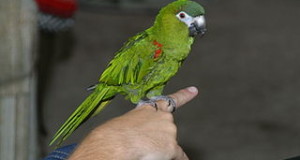 Most parrots, finches and other pet birds are native to tropical habitats, but summer weather can still be a threat to their health. Wild birds have numerous ways to regulate their exposure to extreme temperatures, but caged pets must rely upon us to take action on their behalf.
Most parrots, finches and other pet birds are native to tropical habitats, but summer weather can still be a threat to their health. Wild birds have numerous ways to regulate their exposure to extreme temperatures, but caged pets must rely upon us to take action on their behalf.
Heat Metabolism in Birds
A basic understanding of avian heat metabolism will help you to evaluate the risks presented by the local weather conditions. Birds maintain higher internal temperatures than do people – 105 F for most species, and up to 108 F in some. So, if you are uncomfortable with the temperature, your bird will likely will be so as well.
Most birds also eat more than we do, given their size, and their metabolisms are very fast. Digesting all the food they take in produces a great deal of metabolic heat – a 5 pound chicken, for example, generates the same amount of heat as a 20 watt light bulb (I didn’t do the conversion, but it is a poultry industry standard!).
How Birds Lose Heat
Birds lose heat to the environment in 2 basic ways. Sensible Heat Loss refers to the passive loss of heat that occurs because the bird is (usually) warmer than its environment. This is similar to what occurs when a hot bowl of soup is left out at room temperature. Birds lose more heat when the air temperature is cool, less as it warms up.
Heat is also carried away from the bird via the evaporation of water produced by the respiratory system. This process is known as Latent Heat Loss. Humid air slows the loss of heat via this process, dry air speeds it up.
From this we can see that hot, humid air is the most serious concern for birds and other pets, and people. So perhaps those folks who don’t mind Arizona’s heat so much because “It’s a dry heat” are onto something!
Symptoms of Heat Stress

Treating Over-heated Birds
Heat stress in birds is a serious concern and must be addressed immediately; any delay can quickly lead to a fatality. Misting the bird with cool water is effective, but take care not to startle the bird. Your pet’s immune system will already be in a weakened state, and thrashing about the cage in response to a shower will make matters worse.
If you cannot spray the bird or lower the air temperature by moving the cage or using an air conditioner, veterinary advice should be sought. A vet visit is also in order if you lower the temperature but your bird does not behave normally shortly thereafter.
Avoiding Heat-Related Problems
It’s important to plan ahead so that heat stress can be avoided. Although it’s “common knowledge” that window glass, closed cars and such can greatly magnify the sun’s intensity, tragic accidents, often involving children or disabled adults, still occur regularly. Years ago I experimented with a temperature-sensing gun and found that a car parked in the sun on a warm but not terribly hot day in NYC could reach 155 F within minutes…so take care to keep your bird away from such situations. Closed rooms in full sun can also become dangerously warm in short order.
Air conditioners set at moderate levels and fans are obviously useful; even if the air being circulated is warm, it will help in pulling heat from the bird’s body. Be careful not to direct the air flow directly at the bird, and bear in mind that lowering the humidity will also assist your bird’s natural cooling system (please see above).
 I move the heat-sensitive amphibians in my collection to my basement each summer; this is a good option for birds in extreme weather as well. When doing so, be sure to set a light timer to keep the bird’s normal day/night schedule, as a sudden change can tax the immune system.
I move the heat-sensitive amphibians in my collection to my basement each summer; this is a good option for birds in extreme weather as well. When doing so, be sure to set a light timer to keep the bird’s normal day/night schedule, as a sudden change can tax the immune system.
Gel-based freezer packs placed in zip-lock bags can be used to provide a degree of cool air within the bird’s cage. Be sure to frequently change drinking and bath water, and food, during hot weather. Bacterial growth spikes as temperatures rise, often beginning within 15 minutes of exposure to heat. Cool water for drinking and bathing should always be available.
Further Reading
Wild Cockatoos Likely Killed by Extreme Heat
Heat Stress in Chickens: technical article written for the poultry industry but with useful info for pet owners
Java Sparrow image referenced from wikipedia and originally posted by Kim Bridges
Western Corella image referenced from wikipedia and originally posted by D Gordon E robertson
 That Bird Blog – Bird Care and History for Pet Birds
That Bird Blog – Bird Care and History for Pet Birds




To avoid heat problems in summer season, plenty of clean water must be provided to the birds, not only for drinking, but also for bathing. Birds enjoy taking a bath during summer season. Make sure the bowl you put in the cage for the birds to bath, should be large enough, but not deep, so that the birds can easily bath & play with the water.
Hello Bruce, Frank Indiviglio here.
Thanks for your interest in our blog and useful information. I look forward to your future comments.
Please let me know if you need any further information. Good luck, enjoy and please keep me posted.
Best regards, Frank Indiviglio.
Great article, Frank! I learned a lot on this subject which I thought I already knew plenty. Who knew that a chicken and a low-watt desk lamp had so much in common! 🙂
Much appreciated, Kelly!
Dear Frank in my country it is very hot climate and i had many kind of parrots so can I on fans to cool my parrots………………….
Best regards,Mohebullah Naveed
Hello,
Parrots that ar native to the region are usually fine with local climates, as long as they are not in direct sun or in overly-warm rooms. Fans can be useful…best to create an air flow near the bird rather than directing a strong blast of air right on the bird. You may be able to shut it at night if temperatures drop a bit. An ample supply of water is critical during hot weather; a chance to bathe will also be appreciated by some species. best, frank